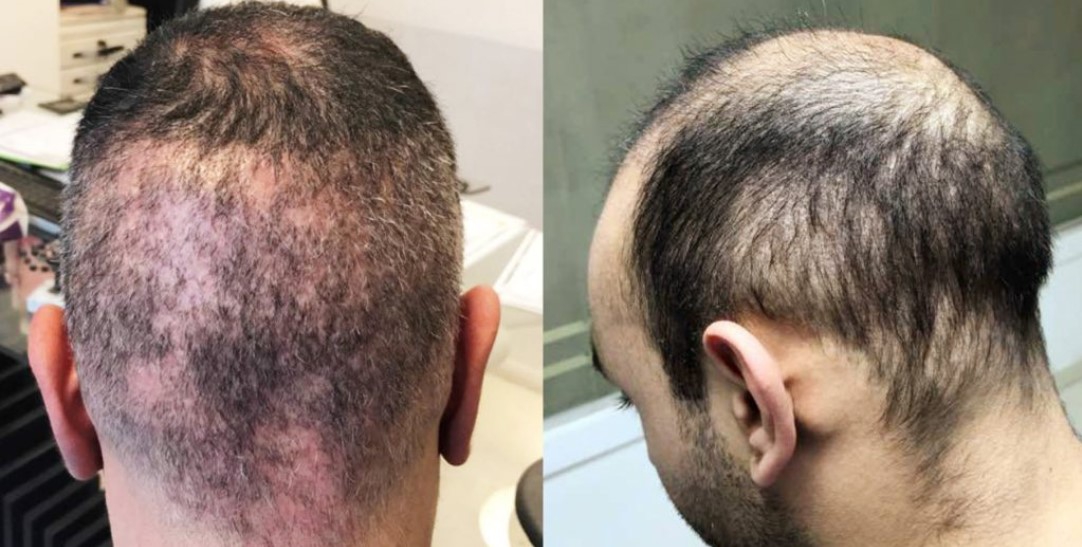Hair Transplant Gone Wrong
2023-09-07 19:17:42
The timeless saying that "you get what you pay for" holds particularly true in the realm of plastic surgery. Lower costs often come with higher risks.
For years, countries like Turkey have been dominant in the market for hair transplant surgery. Their affordable prices and decent surgical quality have drawn thousands of patients from Europe and the Western hemisphere. But times are changing.
With numerous reports of botched hair transplants in places like Turkey, it is now imperative to look beyond. Thanks to the availability of low-cost flights and medical tourism agencies providing reliable medical concierge services, the world has become more accessible for medical tourists. There is no longer a need to compromise quality for affordability.
As the East vs West battle between Korea and Turkey continues, let us explore why you should consider Korea for your hair transplant surgery.
Contents
Signs of an unsuccessful hair transplant include thin or bald patches, scarring, loss of sensation in the scalp, and even infections. Consequently, it is crucial to carefully choose your location, clinic, and surgeon when deciding where to undergo your hair transplant.
A quick search will yield numerous examples and news stories demonstrating people's terrible experiences with low-quality hair transplants.

Moreover, when a hair transplant fails, corrective surgery becomes necessary, leading to additional expenses far beyond the initial budget, often amounting to thousands of dollars.
Referring back to the previous example, an analysis of hair transplants in Turkey revealed that, on average, surgeons were extracting more hair follicles than necessary, and some clinics were conducting up to 50 surgeries a day.
According to a 2022 study by the International Society of Hair Restoration Surgery (ISHRS), a non-profit medical association that includes Turkish doctors, the average number of grafts required per session to achieve satisfactory outcomes was 2,176 grafts.
Harvesting over 3-4,000 follicular units during a transplant can result in severe side effects. An excess of grafts leads to hair thinning in the donor area and a decrease in overall hair density — or even worse consequences. Clearly, this is far from ideal when the goal of a hair transplant is to combat baldness.
Dr. Ricardo Mejia, who serves on the Board of Governors of the ISHRS, warns that "the greatest risk lies in entrusting oneself to unqualified individuals without conducting proper research."

There is no denying the affordability of hair transplants in places like Turkey — the average cost of a procedure in Istanbul, for instance, is around $1,800-2,000, with prices sometimes as low as $1,000.
However, Korea presents a reasonable alternative as it is not significantly pricier. The average cost of a hair transplant in Korea falls within the range of $3,000-5,000. We firmly believe that safety and quality should be the utmost priority.
The Harvard Medical Student Review asserts that "the high supply and easy accessibility of plastic surgery in South Korea may contribute to the affordable pricing of many such procedures. The proportion of plastic surgeons among all doctors in South Korea was 2.6% in 2018/2019, compared to 0.7% in the US."
This brings us to the critical issue at hand. Clinics in South Korea undergo stringent monitoring. The plastic surgery industry is regulated by the Korean Ministry of Health and Welfare, which establishes rules and standards that clinics must adhere to, encompassing facility requirements, cleanliness, and surgeon certification.
There are also organizations like the Korean Society of Plastic and Reconstructive Surgeons (KSRPS) that oversee clinics, ensuring the highest ethical standards.
According to OECD.org, Korea has the highest out-of-pocket healthcare expenditure among all developed countries, along with "universal coverage and one of the highest life expectancies in the world".
Collectively, these factors contribute to positioning Korea as one of the safest destinations globally for elective surgeries.
Pattern baldness, particularly among men, is prevalent in South Korea. An article by Yonhap News Agency states that nearly half of Korean men suffer from hair loss, with causes ranging from genetic factors to work-related stress.
Even numerous Korean celebrities are now undergoing hair transplants.
Consequently, hair transplants have become an established practice in Korea, gaining popularity and effectiveness. Trustworthy and high-quality hair clinics are prevalent throughout Seoul, the capital city.
Last but not least, it is worth delving deeper into South Korea's thriving medical tourism industry.
According to the Harvard Medical Student Review, South Korea currently performs 24% of all cosmetic plastic surgeries worldwide. Considering that the annual global tally of surgeries is around 10-11 million, this statistic is staggering. The math speaks for itself.
Even more astounding is the fact that foreigners account for 40-50% of all plastic surgeries conducted in Korea, amounting to approximately 320,000 procedures in 2017.
The government has actively supported this industry's growth, even establishing the Korean Medical Institute (KMI) through a governmental act. The KMI, in collaboration with the Korean Tourism Organization and the Korean International Medical Association, aims to promote the Korean healthcare industry both domestically and internationally.
For years, countries like Turkey have been dominant in the market for hair transplant surgery. Their affordable prices and decent surgical quality have drawn thousands of patients from Europe and the Western hemisphere. But times are changing.
With numerous reports of botched hair transplants in places like Turkey, it is now imperative to look beyond. Thanks to the availability of low-cost flights and medical tourism agencies providing reliable medical concierge services, the world has become more accessible for medical tourists. There is no longer a need to compromise quality for affordability.
As the East vs West battle between Korea and Turkey continues, let us explore why you should consider Korea for your hair transplant surgery.
Contents
- Hair Transplantation Gone Awry
- The Causes of Failed Hair Transplants
- Hair Transplantation: South Korea vs. Turkey
- 1. Cost
- 2. Safety and Quality
- 3. Prevalence
- 4. Hair Transplants in Korea
- Takeaway
- FAQ
Unfortunate Results of Hair Transplantation
Signs of an unsuccessful hair transplant include thin or bald patches, scarring, loss of sensation in the scalp, and even infections. Consequently, it is crucial to carefully choose your location, clinic, and surgeon when deciding where to undergo your hair transplant.A quick search will yield numerous examples and news stories demonstrating people's terrible experiences with low-quality hair transplants.

Moreover, when a hair transplant fails, corrective surgery becomes necessary, leading to additional expenses far beyond the initial budget, often amounting to thousands of dollars.
Reasons Behind Failed Hair Transplants
The primary cause of unsuccessful hair transplants almost always lies in the underqualified or even unqualified surgeons performing the procedures.Referring back to the previous example, an analysis of hair transplants in Turkey revealed that, on average, surgeons were extracting more hair follicles than necessary, and some clinics were conducting up to 50 surgeries a day.
According to a 2022 study by the International Society of Hair Restoration Surgery (ISHRS), a non-profit medical association that includes Turkish doctors, the average number of grafts required per session to achieve satisfactory outcomes was 2,176 grafts.
Harvesting over 3-4,000 follicular units during a transplant can result in severe side effects. An excess of grafts leads to hair thinning in the donor area and a decrease in overall hair density — or even worse consequences. Clearly, this is far from ideal when the goal of a hair transplant is to combat baldness.
Dr. Ricardo Mejia, who serves on the Board of Governors of the ISHRS, warns that "the greatest risk lies in entrusting oneself to unqualified individuals without conducting proper research."
Hair Transplants: South Korea vs. Turkey
With South Korea's plastic surgery industry estimated to be worth $10.7 billion, it comes as no surprise that more and more individuals are opting for elective surgeries and medical tourism in the country.
1. Cost
There is no denying the affordability of hair transplants in places like Turkey — the average cost of a procedure in Istanbul, for instance, is around $1,800-2,000, with prices sometimes as low as $1,000. However, Korea presents a reasonable alternative as it is not significantly pricier. The average cost of a hair transplant in Korea falls within the range of $3,000-5,000. We firmly believe that safety and quality should be the utmost priority.
The Harvard Medical Student Review asserts that "the high supply and easy accessibility of plastic surgery in South Korea may contribute to the affordable pricing of many such procedures. The proportion of plastic surgeons among all doctors in South Korea was 2.6% in 2018/2019, compared to 0.7% in the US."
2. Safety and Quality
This brings us to the critical issue at hand. Clinics in South Korea undergo stringent monitoring. The plastic surgery industry is regulated by the Korean Ministry of Health and Welfare, which establishes rules and standards that clinics must adhere to, encompassing facility requirements, cleanliness, and surgeon certification.There are also organizations like the Korean Society of Plastic and Reconstructive Surgeons (KSRPS) that oversee clinics, ensuring the highest ethical standards.
According to OECD.org, Korea has the highest out-of-pocket healthcare expenditure among all developed countries, along with "universal coverage and one of the highest life expectancies in the world".
Collectively, these factors contribute to positioning Korea as one of the safest destinations globally for elective surgeries.
3. Prevalence
Pattern baldness, particularly among men, is prevalent in South Korea. An article by Yonhap News Agency states that nearly half of Korean men suffer from hair loss, with causes ranging from genetic factors to work-related stress. Even numerous Korean celebrities are now undergoing hair transplants.
Consequently, hair transplants have become an established practice in Korea, gaining popularity and effectiveness. Trustworthy and high-quality hair clinics are prevalent throughout Seoul, the capital city.
4. Hair Transplants in Korea
Last but not least, it is worth delving deeper into South Korea's thriving medical tourism industry. According to the Harvard Medical Student Review, South Korea currently performs 24% of all cosmetic plastic surgeries worldwide. Considering that the annual global tally of surgeries is around 10-11 million, this statistic is staggering. The math speaks for itself.
Even more astounding is the fact that foreigners account for 40-50% of all plastic surgeries conducted in Korea, amounting to approximately 320,000 procedures in 2017.
The government has actively supported this industry's growth, even establishing the Korean Medical Institute (KMI) through a governmental act. The KMI, in collaboration with the Korean Tourism Organization and the Korean International Medical Association, aims to promote the Korean healthcare industry both domestically and internationally.

